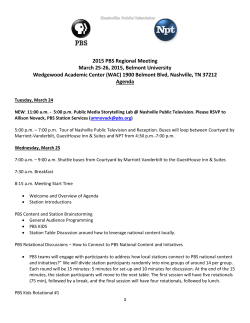
PBS Hawaii`s NEW HOME Campaign Moves Forward
PBS Hawaii’s NEW HOME Campaign Moves Forward Robbie Alm In 2016, after more than 50 years, we will be leaving the Manoa campus of the University of Hawaii to move to our new headquarters at the entrance to Sand Island. We have loved our years on the campus growing from a small Educational Television (ETV) office in Wist Hall to our current studios on Dole Street. We have had generations of students assist us and learn at the same time, and one of them (Charlyn Honda Masini) is now on our Board of Directors. We have featured university scholars and university events in our programming. We honor the university and appreciate that while they very much need our space, they are making the transition a good one for both of us. Trucks will carry our equipment, including our satellite dishes, a little over seven miles to our new home. Those few miles can in no way capture the dramatic changes that the move to our new headquarters represents for PBS Hawaii. Our new home will have studios – three in fact – from the main studio, observable in places through walls of glass, to a small studio suited for individual interviews. It will incorporate social media into its daily functioning as part of our ongoing commitment to follow our viewers down the communications paths they choose to pursue. Its offices will be as open and accessible as we can make them; we are one highly efficient and agile team and our space needs to help us live that way. We are your team; and if you visit us, we want you to feel that we are an “open book.” It will feature a large area, the Media Innovation Center, dedicated to our next generations. Headquarters for our flagship HIKI N -O program, this space has been designed based on input from young people to be virtually without walls, allowing the greatest possible collaboration – the way in which they create best. It will acknowledge everywhere all of those who made the new headquarters possible. Our new home is for PBS Hawaii and the 21st century. It is built to be both a solid foundation for the quality programming we will continue to create and to sponsor, and a platform from which we can continually evolve the ways we interact with viewers. The total cost of the project is $30 million. To date, we have raised more than 70 percent of that total, nearly $22 million. Last month, we completed the sale of a vacant lot in Waikiki and the proceeds will be used for our new facility. We are now in the home stretch and can use everyone’s help. Moving “homes” is a very big deal for us, and we intend this move to be our last. We also see it as a once-in-a-lifetime moment to change who we are so that we remain as vital a part of Hawaii’s new century as we were of its last. We are thrilled at what this move will allow us to become. We welcome any of your suggestions on who you think might support us. Let either Leslie (lwilcox@ pbshawaii.org) or me (robbie@clnhawaii.org) know who, and we will follow up. If you are willing to assist yourself, we would be deeply grateful. Again, thank you for your years of dedicated support; we are the “award-winning PBS Hawaii” because of you. Robbie Alm Chair, PBS Hawaii
© Copyright 2025



















